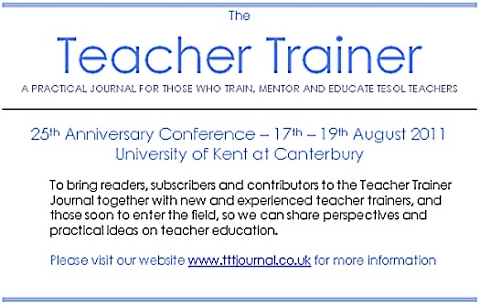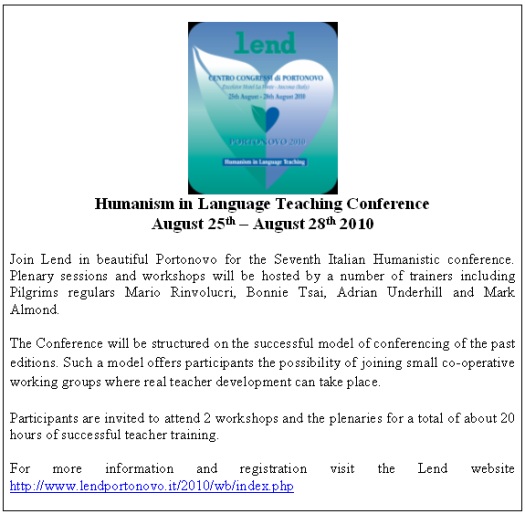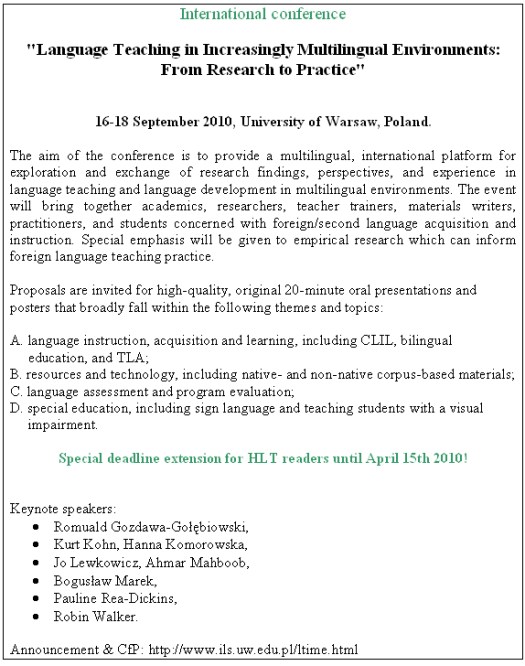Dear HLT Readers,
Welcome to the August issue of HLT. As I write this the Pilgrims summer is in full swing. Overall this summer we expect around one thousand teachers attending our courses. But remember you can come any time during the year with a group of your colleagues to attend a course specially designed for you. You can read about it in: Tailor-made Group Courses at Pilgrims by Mandy Briggs. The Pilgrims atmosphere is unique and it has been well captured in this issue in a poem by Fiona James called Pilgrim’s Progress.
You will also find three articles devoted to metaphor: Metaphors We Teach By: Some Procedures that Trigger EFL Teacher Trainees’ Reflection by Grażyna Kiliańska-Przybyło, Me in Metaphors: Discovering and Uncovering Myself Through NLP and Multiple Intelligences by Anila R. Scott-Monkhouse and Enrica Rigamonti and The Teacher as Circus Performer by Alan Maley. This is a subject that does not get written about a lot so I find that having so many articles on the subject quite unique. Personally I love metaphors, stories and anecdotes that illustrate the point. I find they are a kind of ‘visual’ material illustrating the point I am trying to make. However, I know that there are teachers who do not like this medium. Perhaps the articles will make them change their minds.
|

In 2011, the Teacher Trainer journal will be 25 years old!!!! So we want to celebrate that quarter of a century. We hope you will join us at our:
25th Anniversary Conference
When is it? 17-19th August 2011.
Where is it? University of Kent at Canterbury, Kent, England.
Why? We want to bring together readers, subscribers and contributors to the journal with new and experienced teacher trainers plus those soon to enter the field so we can all share perspectives and practical ideas on teacher education.
Who? Speakers so far include Penny Ur, Mario Rinvolucri, Briony Beaven, Seth Lindstromberg and Tessa Woodward.
If you would like to book a place, please contact:
lizzie@pilgrims.co.uk
Background information
In case you have not come across us before, The Teacher Trainer journal will help you in your work if you are a mentor, teacher trainer, teacher educator or director of studies. Or if you are a senior or experienced teacher who sometimes has to observe language teachers and give feedback on their work or give workshops, design courses, set up resource rooms or network with teachers. It comes out three times a year and is always looking for readers, subscribers, contributors and advertisers.
The Teacher Trainer contains practical ideas that you can use in your work with teachers tomorrow, as well as thought-provoking accounts of a more long-term benefit. It's written by fellow professionals, often working in tightly prescribed circumstances and doing their very best to engage in an interesting, balanced and humane way with the teachers and students they work with. The voices of the teachers and trainers themselves are also included, as are trainer conference reports, description of useful books and articles, ideas for running sessions and making observation and feedback more fruitful, and ideas brought in from parallel fields.
The web site at www.tttjournal.co.uk is refreshed three times a year. There you can read articles from past issues as well as learning about the most recent issue (March 2010) and get information on contributing, subscribing and advertising.
The journal is edited by Tessa Woodward, a working language teacher, teacher trainer and trainer trainer. She is an author of many books and articles and often presents at conferences. She is also a Past President of IATEFL.
For further information please visit the web site at: www.tttjournal.co.uk
|
Two articles look at the profession of the teacher, and how it relates to other professions and what we can learn from other professions: Work Habits of Two Craftsmen by James Porcaro and Rob Porcaro, and What a Teacher Learned from Being a Musician by Chaz Pugliese. One could say that they are in a sense related to the metaphor theme.
Another two articles look at the role of the teacher and the teaching-learning situation: Teachers as Providers of Education, the Most Precious Asset by Consuela Popa and The CELTA Crisis or Busting the Box by Marie Dixon Frish.

This issue also looks at the way we develop materials for the classroom and how we design classroom activities around particular language skills. Sinan Mısırlı raises some general issues in the article: Materials in TEFL: A Discussion of What Lies Behind Them and Implications, In a major article The Use of Authentic Materials in Teaching EFL Listening, Ji Lingzhu and Zhang Yuanyuan offer an overview of types of authentic listening materials. In Skype in the EFL Class Cristina Arnau Vilà looks at using modern tools and blended learning for teaching listening and speaking. Gulnare Hajiyeva also writes about these two language skills in: How to Make Listening and Speaking More Enjoyable. Two articles look at reading as a skill: Saying and Sense: Speech Movements and Imitation in Expression and Reading Aloud by Edwin Salter and The Heart of the Matter: On Reading by Lou Spaventa.
Visual materials are a type of teaching aid teachers like to prepare and make. This is the topic Eva Homolová has focused on in her article: Authentic Visuals in Teaching and Learning English, while Ian Michael Robinson shows us how to use the language corpus as teaching material: Creativity and Corpus Linguistics: Using a Corpus to Write Stories.
|

Dear Colleague,
We would like to inform you that IATEFL-Hungary's annual conference this year is to be held in Zánka on 8-10 October 2010. The motto of the event will be *"Standing Out or Being Outstanding" Exploring new normalities in the classroom.*
**To give you an idea of what an IATEFL-Hungary conference is like, please,
take a look at the video www.youtube.com/watch?v=8EGq2P8SQwo made
at last year's conference in Budapest.
The *deadline for submitting speaker proposals is **31st March 2010.* The deadline for *early bird registration is extended this year till **30th June 2010*. Please find all conference documents on our website www.iatefl.hu
We hope that the extended early bird registration date will allow you enough time to consider attending our 20th annual conference as a presenter or as a participant in October in Zánka, and that we shall be able to welcome you among our members in the association.
With very best wishes,
The Committee of IATEFL-Hungary
|
Also in this issue as usual there are articles in the Lesson Outline section, with more practical ideas for the classroom: Using Cuisenaire Rods in the Business Classroom by Rosie Norman, Engaging the Disengaged: A Story-telling Activity Which Raises Awareness of How We (Don’t) Listen to Each Other by Karen Geiger, Personalising Possibility: An idea for a Concept-clarifying Lesson by Konrad Brodzinski and Organising Free Speaking by our regular contributor Simon Mumford.
As usual there is news about new developments in the publishing world: Seeds of Confidence: Self-esteem Activities for the EFL Classroom, by Jane Arnold and Veronica de Andrés, Great Expectations: The Graphic Novel by Neil McBeath and In A Faraway Land by Michael Berman.

Finally, for your entertainment there are poems: Black and White by Paul Bress and Time Is a Tyrant - It Turns You Into Its Slave by Angelica Araya, as well as jokes: Jokes from the Rural Punjab, submitted by Muhammad Iqbal and Submitted by a Primary School Girl for a Homework Assignment, submitted by Kasia Krawczyk.
Enjoy the issue
Hania Kryszewska
HLT editor
hania.kryszewska@pilgrims.co.uk



|